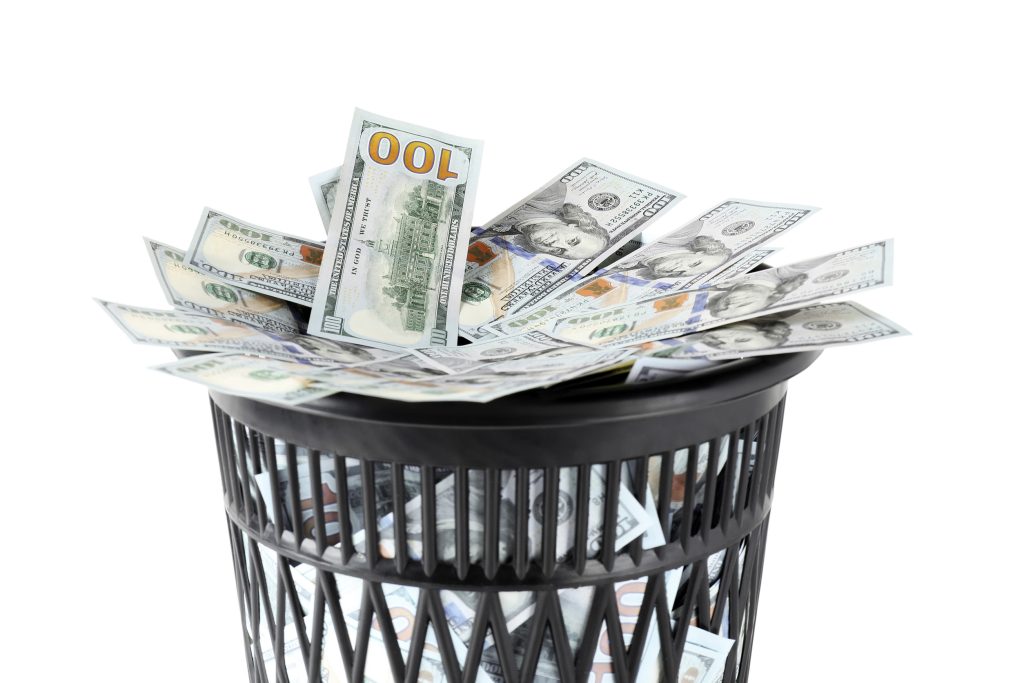
You work hard for your income, meticulously tracking your spending and sticking to a budget. Yet, at the end of the month, you might still wonder where it all went. The culprit is often not a big, impulsive purchase, but a series of quiet, passive losses that drain your finances without you ever opening your wallet. This invisible leakage, known as phantom spending, occurs when you lose value or pay for things you don’t fully use. Identifying the ways you are wasting money through inaction is the key to plugging these financial leaks and keeping more of your hard-earned cash.
1. Letting Subscriptions Auto-Renew Unchecked
That free trial you signed up for months ago or the streaming service you no longer watch can become a persistent drain on your bank account. Companies rely on consumer inertia, knowing that many people will forget to cancel before the auto-renewal date hits. Each small, recurring charge adds up significantly over the course of a year, silently wasting money on services you don’t need or want. Take thirty minutes every quarter to audit your bank and credit card statements for recurring charges and cancel everything you aren’t actively using. This simple habit can save you hundreds of dollars annually.
2. Ignoring Food Spoilage
Every time you throw away wilted lettuce, fuzzy strawberries, or expired yogurt, you are literally tossing cash into the garbage. We often buy groceries with the best of intentions, but busy schedules and poor planning lead to significant food waste. This isn’t just a couple of dollars here and there; the average American family throws out a substantial amount of food each year. Combat this by planning your meals, shopping with a list, and learning to properly store produce to extend its freshness. Being more mindful in the kitchen is a direct way to stop wasting money.
3. Forgetting to Use Rewards Points and Gift Cards
Credit card rewards, loyalty points, and gift cards are forms of currency, yet they often sit unused and forgotten. Many programs have expiration dates, meaning those valuable points can simply vanish if you don’t pay attention. You are essentially turning down free money or discounts that you have already earned through your spending. Make it a habit to check your rewards balances before making a purchase and keep gift cards in your wallet, not a drawer. Cashing in on these benefits is an effortless way to boost your budget.
4. Neglecting Preventative Maintenance
Skipping that routine oil change for your car or putting off the annual service for your HVAC system might feel like you’re saving money in the short term. However, this neglect often leads to much larger, more expensive problems down the road. A minor issue that could have been fixed for a small fee can escalate into a catastrophic failure costing thousands to repair or replace. Investing in preventative maintenance is one of the smartest financial decisions you can make. It protects your valuable assets and prevents you from wasting money on emergency repairs.
5. Paying for Unused Memberships
That gym membership you bought as part of a New Year’s resolution or the warehouse club card you used only once are classic examples of wasting money on good intentions. It’s easy to justify the expense by telling yourself you *will* use it eventually, but if months have passed without a single visit, it’s time to be honest with yourself. These memberships are designed to profit from the gap between aspiration and actual behavior. Cancel them without guilt and find cheaper, more flexible alternatives that better suit your lifestyle.
6. Overlooking Energy Vampires
Many of your electronic devices continue to draw power even when they are turned off, a phenomenon known as phantom or vampire load. Your television, coffee maker, computer, and phone chargers are all constantly sipping electricity while in standby mode. While the cost per device is small, the cumulative effect of dozens of gadgets can add up to a noticeable amount on your monthly energy bill. Get in the habit of unplugging electronics when not in use or connecting them to a smart power strip that can be switched off completely.
7. Not Taking Advantage of Your Employer’s 401(k) Match
If your employer offers a 401(k) matching program and you aren’t contributing enough to get the full match, you are leaving free money on the table. This is arguably one of the most significant ways people are wasting money without realizing it, as it directly impacts their future wealth. The employer match is a guaranteed, risk-free return on your investment that is nearly impossible to beat elsewhere. Make it your top financial priority to contribute at least enough to receive the maximum company match; otherwise, you are essentially refusing a raise.
Plugging the Leaks in Your Budget
Financial health isn’t just about earning more; it’s about being a wise steward of what you already have. The biggest threats to your budget are often not the lattes or lunches out, but the silent drains that go unnoticed. By paying attention to subscriptions, preventing waste, and taking advantage of earned benefits, you can reclaim hundreds or even thousands of dollars each year. Being proactive about these passive losses transforms you from a spectator into an active manager of your financial well-being, ensuring your money works for you, not against you.
What’s one surprising way you’ve found to stop wasting money in your own life? Share your best tip in the comments below!
Read more:
6 Financial Traps That Erase Your Legacy
6 Financial “Favors” That Can Be Prosecuted as Fraud
The post 7 Ways You’re Wasting Money Without Even Spending It appeared first on Budget and the Bees.







